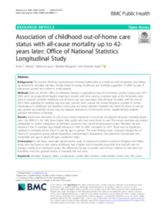Displaying 391 - 400 of 2221
This study examined whether childhood out-of-home care was associated with all-cause mortality until the end of 2013 in the UK.
This exploratory secondary data analysis compares demographics, mental health/well-being, and protective mothering strategies of mothers who have experienced intimate partner violence (IPV) whose children were taken into care compared to those whose children were not to identify key characteristics associated with children being removed by child protective service (CPS) in Western Canada.
The aim of this study was to investigate the prevalence of depression, anxiety, and resilience in Eritrean unaccompanied refugee minors living with foster parents in Sudan.
The purpose of this study was to evaluate the consequences of criminal justice–related prenatal substance use policies for family reunification and to examine differences in parental reunification by racial/ethnic group.
The current study uses two randomized control trials, one conducted with foster caregivers and one conducted with birth parents, to investigate the longitudinal effects of caregiver type (foster versus birth parent) and a home-visiting parenting intervention on emotion regulation among young children referred to Child Protective Services (CPS).
This article presents a multi-site evaluation of a group delivery of the eight-week Circle of Security-Parent DVD program (COS-P) program to foster carers of 6-12 year-old children in an urban community as facilitated by community-based providers from a specialist child and youth mental health services.
This paper examines the frequency with which transition-age foster youth receive asset building services and whether the youth who receive services experience improved outcomes compared to those who do not.
The authors of this study analyzed data from a randomized clinical trial of the middle school version of the Keep Safe intervention - an intervention that targets delinquent peer affiliation - in a sample of girls in foster care. The researchers found that the middle school Keep Safe intervention shows promise as a preventative intervention for reducing affiliation with delinquent peers, which importantly is associated with adolescent delinquent behavior.
This study is a systematic review of the scholarly literature to better understand caregiver-related factors (e.g., characteristics, proficiencies) that contribute to permanency and placement stability, in order to provide a stronger foundation for developing and improving caregiver recruitment and training procedures.
The current study examined the attachment development of 92 internationally adopted Chinese girls, focusing on the influence of type of pre-adoption care (institutional versus foster care) and sensitive adoptive parenting.

